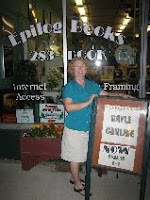
Friday night's speaker at the SCWC was Monte Schulz. He wrote a 900-page novel in ten years, spent eight years trying to get it published, finally broke it into three smaller novels, and got a publisher for all three books plus two more.
I would have thought it'd be easy for him. After all, he's Charles Schulz's son.

His speech was like a vocal pendulum, swinging from point to counterpoint. At first, he sounded as if literary fiction were the only books worth reading and all else was drivel. Then he told us of reading Stephen King and Clive Cussler and he didn't care if they weren't literary giants because they told great stories. In the next breath, he described a way of writing about a subject that no one else had thought of before and wasn't he just the genius of the century? As soon as I wanted to roll my eyes, he made a self-deprecating joke and disarmed me. He spoke of times when he wrote one sentence a day for a month, and I thought, I'd rather stick a sharp object in my temple than write that slowly.
Still, I was intrigued enough to attend his workshop the following day, "Using Style to Transcend Substance." He read us works from Truman Capote and Norman Mailer and Eugene O'Neill and more. He then said that many genre writers are great storytellers, but not great writers. And he laid down the challenge: If you love genre writing, why don't you resolve to be the best ever? Why whip out two novels a year (or, in James Patterson's case, a dozen) of mediocrity, when you can take your time and mold a work worth not just reading, but re-reading?
It dawned on me, as I heard him read from Other Voices Other Rooms, that the words became their own layer of the story and they sang to me and reached into me and beyond me and pulled me into another stratum. This is the hallmark of great literature and sets it apart from the plethora of pop fiction on Amazon. I listened and knew the difference between Capote's writing and my own: my writing skips across the surface of your consciousness like a flat pebble on taut water. You might like it, you might think it's a fun, quick read, but would you re-visit it? I could only come to one conclusion:

Wah! I wanna write like that!
To inspire you the way Monte inspired me, here is a passage from Death Comes for the Archbishop, describing Father Latour's impression of Trinidad Lucero.
"His fat face was irritatingly stupid, and had the grey, oily look of soft cheeses. The corners of his mouth were deep folds in plumpness, like the creases in a baby's legs, and the steel rim of his spectacles, where it crossed his nose, was embedded in soft flesh. He said not one word during supper, but ate as if he were afraid of never seeing food again. When his attention left his plate for a moment, it was fixed in the same greedy way upon the girl who served the table - and who seemed to regard him with careless contempt. The student gave the impression of being always stupefied by one form of sensual disturbance or another."
Today's editors might be tempted to tell Willa Cather to shorten this; she has broken every rule of the New Age of Writing with her passive tense and use of adverbs, but would you truly want to miss this opportunity to wallow in the images she has given us? The way that last sentence ties the paragraph up is so stunning, I want to go out and look at the world and learn how to describe it as Willa does.
Don't you?










